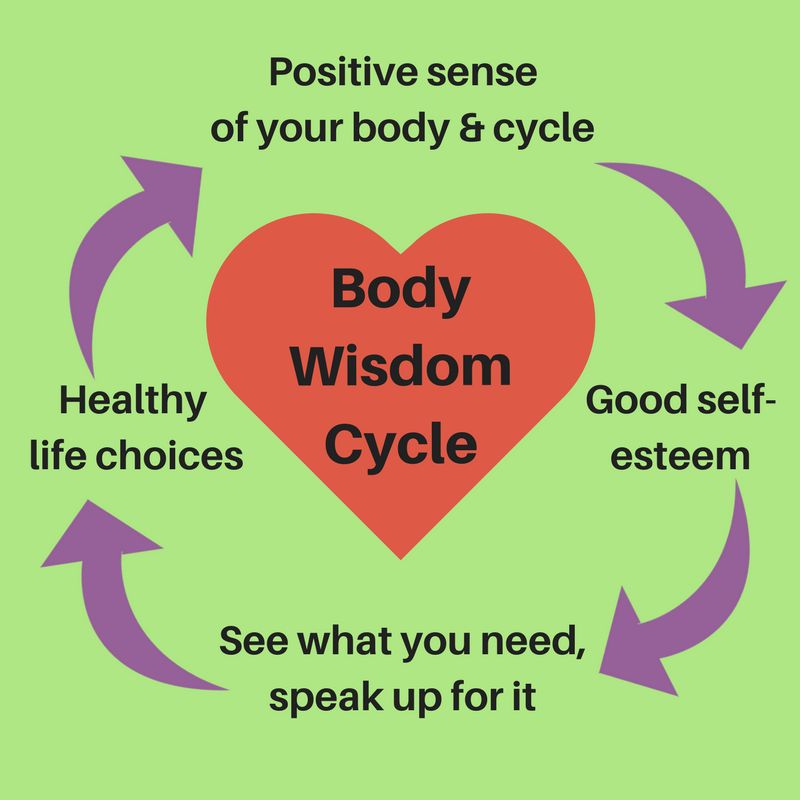 Your daughter's journey into womanhood is directly influenced by what she sees around her Your daughter's journey into womanhood is directly influenced by what she sees around her We cross the bridge into adulthood having watched how our parents treat and talk (or don’t talk) about their own bodies, relationships and needs, and this can go a long way to supporting our own positive sense of our body and self. Imagine you’re a baby getting your nappy changed. Your mum screws up her face and says ‘Stinky poo!’ You don’t understand the words yet but you hear the disapproving tone as she cleans up the ‘mess’ that you had enjoyed pushing out. Over time, you learn to hide your bodily pleasure. Imagine you’re a toddler, and your parents teach you to wash yourself ‘down there’ and never actually use the word vulva. Over time, you learn that talking about your sexual organs is not acceptable. Imagine you’re primary school age, and it’s normal for you to hear your mum complaining about her weight, wishing that her belly were smaller, comparing other people’s legs to hers and seeing her go on diets. Over time, you learn to compartmentalise and objectify your body. Imagine you’re a teenager, and your parents have only ever talked with you about sexuality once, when your body first started changing. They’ve never talked with you about the pleasures of intimacy with a partner. Over time, you learn that this is not something you learn about or discuss with your loved ones. Developing a healthy connection to your sexuality begins early in life and continues through your primary school years, even before puberty’s changes. Five-year-olds can learn about consent and internalise their rights and skills in giving a clear yes or clear no to how they are treated by others. I’ve heard that sexual predators prey on the less confident children. If a child doesn’t know the parts of their body or can’t speak up about their boundaries, it’s easier to keep them silent around something they sense is shameful. Criteria for emotional well-being … and sexual interest and satisfaction If a young person has low self-esteem, limited ability to self-soothe, poor coping skills and negative body image, they will struggle, according to Evelyn Resh, author of The Secret Lives of Teen Girls. We want our children to connect with themselves and their own needs, and enjoy intimate relationships. Resh’s criteria for this are: Reflection questions and/or strategies for parents from Secret Lives of Teen GirlsAround your own approach
Around conversation about bodies and sexuality Normalise sex and sexuality in conversations, both with your daughter and in your own life.
Around self-care She needs to see you live a life that includes sensual pleasure for you! How do you feel about your own body? Are you connected to your menstrual cycle and its associated changes in body, mood and energy?
Around rules Reflect on your experience as a teen and your parenting now. Are you repeating your mother’s style or have you adapted your rules to what’s appropriate for your daughter and these times?
Around Sexually Transmitted Infections (STIs)
The cost of hidden stress and why we need to speak up Let's be warriors AND magic-workers Let's be warriors AND magic-workers When the body says no: Exploring the stress-disease connection, Mate, Gabor, 2003, John Wiley & Sons, Inc, NJ. This book both shocked and inspired me. It may seem odd that I’m referencing a book called When the body says no: Exploring the stress-disease connection from my Daughters and Sexuality workshop, but I really believe we need to help our children to listen to their bodies, recognise what they need (and deserve to have), and then have the confidence to speak up for this, either in relationships or with health professionals. This book freaked me out a little, because it looks at all the ways that putting others before yourself, denying your own needs (and gut feeling, which can be ignored so often that you no longer recognise it), staying cheerful and repressing anger lead to long-term stress on your body, which can then emerge with scary effects on your auto-immune system. And parents beware: we learn these ‘skills’ from our family of origin. Maté’s seven As of healing - and how I believe they relate to your daughter's sexualityAcceptance The willingness to recognise and accept how things are, and the courage to permit negative thinking. Awareness We can learn to read symptoms not only as problems to be overcome but as messages to be heard. Anger Repression of anger is a major risk factor for disease, but anger differs from rage or hostility. Healthy anger is an empowerment, but repression and rage represent fear of the genuine experience of anger. Autonomy People suffer when their boundaries are blurred. Boundaries and autonomy are essential for health. Autonomy is the development of that internal centre of control. Attachment Connection is vital to healing. Behind our anger lies a deeply frustrated need for truly intimate contact. Healing both requires […] regaining the vulnerability that made us shut down emotionally in the first place. Assertion Assertion challenges the belief that we must somehow justify our existence. It is being, irrespective of action. Affirmation Health rests on 3 pillars: the body, the psyche and the spiritual connection. To ignore any one of them is to invite imbalance and dis-ease. Now, this is a mighty list of ideas, and I'm not saying that you're doomed if you're not perfectly well-adjusted. Believe me, I have to put my hand up for plenty of mistakes and bad habits in how I live and relate to others. All we can do is keep building our awareness and compassion, for ourselves as much as for those around us. But if you’re true to yourself, speaking up for what you like and don’t like, you’re much more likely to have friendships, relationships and sexual experiences that are mutually pleasurable, fun and nurturing for you. Which means that you can live sustainably and well, doing good and caring for our world. And I don't know about you, but that's all I'm after. World peace and a great life for everyone. References I mention in my Daughters and Sexuality workshopHere’s a list with some overview of what each reference is about. If you recall one that I mentioned that isn’t here, please ask me! I have a resource booklet that includes reviews, resources and quotes from them, which you can email me to purchase a copy for $15 plus postage. : )
TED Talks Listening to shame and The power of vulnerability by Brene Brown. Her work is powerful. If you haven’t seen these or read any of her books, please do! A Blessing not a Curse: A Mother daughter guide to the transition from girl to woman, Bennett, Jane A great guide, with stories, practical tips and great cultural stories, too. The Secret Lives of Teen Girls: What your Mother Wouldn't Talk About but your Daughter Needs to Know, Resh, Evelyn 2009, Hay House Inc, California, USA. This was the book that inspired me to first present this workshop on daughters and sexuality. I highly recommend it. Queen Bees and Wannabes Wiseman, Rosalind. Really readable, insightful and practical, including examples of what to say to your daughter in various tricky friendship situations, looking also at pressures of body image and expectations in teen relationships. Eye-opening and helpful. Things Girls Need from their Fathers An article from the Huffington Post, posted 06/18/2013. This is really great for all parents to read, and makes infinite sense. As soon as you have a baby is a great time to read this! Linked to a similar article for what is needed from mothers. Talk Soon. Talk Often. A guide for parents talking to their kids about sex. Free downloadable booklet from Government of Western Australia Departent of Health. A great guide for what is appropriate to say when, with examples. Nice layout with lovely pics, too! When can teenagers have a partner sleep over? Article by Maddy Silver, Sydney Morning Herald 17/3/14. Really great food for thought. Compares the Netherlands and the USA; in the former case, with parents more open and accepting of teen sexual relationships, there’s less teen pregnancy. Puberty Girl Movsessian, Shushann 2004 Allen and Unwin, Sydney. This is for mature pre-teens and teens – really friendly language that tells you the straight-up facts in a non-medical way. TED Talk: Your body language may shape who you are, Cuddy, Amy (who also researched and wrote the great book called Presence: Bringing your boldest self to your biggest challenges, 2016 Orion, London. Great research on power poses and how you can develop greater self-confidence.
1 Comment
 A girl’s father is the most influential man she will ever have in her whole life. His parenting directly affects her experience of puberty, her menstrual cycle and sexuality. How much a dad says or doesn’t say, how much time and attention he shares with her, his attitude to her body, achievements, relationships – inform her view of all men. In her life, whether straight or gay, there will be so many men in many different roles: friends, lovers, co-parents, clients, bosses, subordinates – all perceived with filters formed by who her father was for her as she grew up. Yes, there’s therapy, and life learning as an adult… But gee it’s great if a father takes time to consciously consider the impact he has on his young daughter as she grows. I offer an evening for dads called Fathers Celebrating Daughters, where we talk about issues they face as their daughters line up for or are in the roller coaster of puberty. Below are a few of the things that we talk about. Which ones did your dad fall into or sidestep? 7 Common Dad Traps 1. Limiting physical affection Dads often feel uncomfortable when their daughter’s body begins to change; they can be concerned that they look like a predator if someone misinterprets their physical affection with their daughter, so they begin to keep their girls at arms’ length. Dads need to stop worrying about this, or a girl gets the message that developing a womanly body is not something worthy of affection. Fathers, please keep up the hugs. 2. Taking a back seat and slackening the lines of communication During puberty and adolescence, girls naturally become more independent. Fathers often think that it’s best for them to leave the emotionally charged situations to mothers; that girls aren’t that interested in doing stuff with dad anymore, seeing as social media and their friends are so important; and that there’s no need to demand regular time with their girl who is fast becoming a young woman. In fact, girls shine when their dad gives them a compliment. And establishing a regular activity together means there’s always space to chat, where something that’s been bothering her can casually come up. Dads can be the ones to create the safe boundaries. In centuries past, it meant ordering the drawbridge to be taken up. These days, it might be creating a family contract around the use of screens. Rosalind Wiseman has a great example of one in Queen Bees and Wannabes (Email me if you'd like to see her version).[1] 3. Avoiding talk about bodies or sex Do you know a dad who avoids using the actual names for his daughter’s body parts? Girls need to know that they have a vulva, not a ‘down there’. From toddler to pre-pubescent to teenager, if your father is avoiding talk about your body and sexual behaviour, you get the message that you are not to openly discuss your body or its needs, and that becoming a sexual being is not something to be proud of. I love what Joyce McFadden says about dads who avoid body/sex talk: Parents don't wince over things they're proud of or happy about in their kids, and even our youngest daughters understand this. […] So, when you reveal your discomfort with your daughter's sexuality, you're unintentionally teaching her it's either something to be afraid of or something to be disdained. You'll also be directly or indirectly teaching her you don't want to be involved in knowing that part of her, and that will probably create distance in your relationship. None of this will enhance her self-esteem or her ability to believe you love her unconditionally. 4. Cracking jokes about her changing body and/or commenting on women’s bodies Dad Jokes are a time-honoured institution. But some things need to be off-limits. A quick one-liner about a body part or a crush can burn into a girl’s memory for years, if not a lifetime. It is such a sensitive time as they grow taller, wider, curvier during puberty. Many women have a painful story from a thoughtless comment made about their body. “I didn’t wear T-Shirts for years after that,” I remember one woman telling me. Here are three statements on girls and eating disorders from Nigel Latta’s Fathers Raising Daughters that I find telling:
Yes, tell her she’s beautiful. But letting her know that you value is who she is, and what she does, rather than assessing and praising her physical features gives her a healthy set of priorities. 5. Leaving talk about periods to the women Some dads ignore the fact that their daughter has a period, which can send the message that it is an unspeakable subject. Easy for girls to translate ‘not to be spoken of’ into ‘not to be proud or open about’. Last year I volunteered as a facilitator in the Waratah Project with the Victorian Women’s Trust. The first of its kind in the world, we listened to groups of women talk about their experience of menstruation and menopause. Every now and then, we would hear someone report that their dad congratulated them when they first got their period. They would often say this with a satisfied smile, even if they added that they were embarrassed by it at the time. And do you know, these were often women who had a positive approach to their menstrual cycle ever since. 6. Missing the teachable moments The more you talk about important issues, the better. Dads often think that once they’ve done ‘the talk’, their job is done (or they avoid it altogether and hand the whole thing over to Mum). Learning about your body is a process that takes years and hundreds of conversations. If the majority of them are with great role models, a girl can get the right messages:
7. Fixing her problems for her It’s really admirable that a dad wants to fix his daughter’s problems for her. The problem with that is that she doesn’t learn to fix them herself. Help her to find a way, and only step in if she’s really over her head. And rather than seething, refusing to talk about it or cracking it, at some point it’s great to say thanks for letting you know, and that together you’ll work out how to resolve things. And while we’re talking about mistakes, it’s helpful if girls get to hear that sometimes their dad is vulnerable too. Daughters work extra hard to show their fathers that they’re doing well, that everything is fine and under control, because they don’t want to disappoint. If dads show their weaknesses, it’s easier for their girls to come to them about their own problems. There are so many opinions out there on dads and daughters… What was the best thing about the way your dad parented you? I’d love to hear. And feel free to contact me if you'd like a father you know to come along to one of our Fathers Celebrating Daughters evenings, or take part in A Celebration Day with your 10-12 year old daughter. Warm blessings and billowing blossom to you Janoel Email: [email protected] Ph: 0408 664 919 [1] Wiseman, Rosalind Queen Bees and Wannabes: Helping your Daughter Survive Cliques, Gossip, Boyfriends, and the New Realities of Girl World, Three Rivers Press, NY, 2009, 2nd ed [2] Latta, Nigel Fathers Raising Daughters, HarperCollins, Auckland 2010, p. 195 |
Author
-Janoel Liddy is passionate about girls and women recognizing and acting on their needs to lead a satisfying life. She teaches puberty and wellbeing to girls and boys in schools, facilitates workshops and retreats and works with groups in TAFE, university and community organisations in training and events. She is a mother of two with her partner of over two decades and dances, cooks, reads and writes when she can and must. Categories
All
Archives
April 2018
|



 RSS Feed
RSS Feed